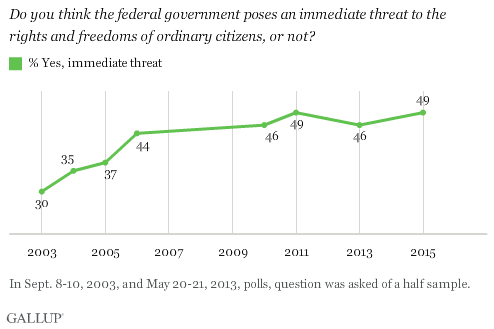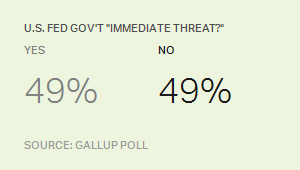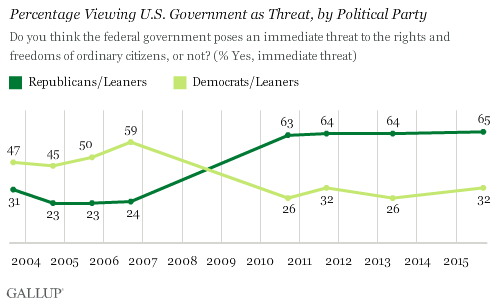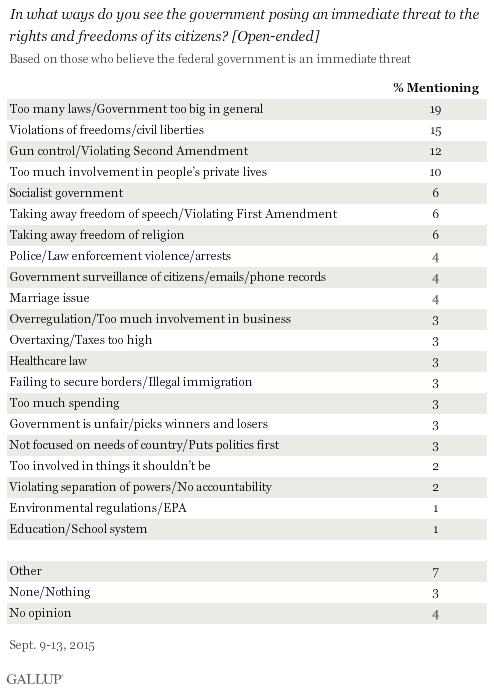Story Highlights
- 49% say government poses immediate threat to rights, freedoms
- Republicans much more likely to see government as threat
- Americans give very diverse explanations for these views
PRINCETON, N.J. -- Almost half of Americans, 49%, say the federal government poses "an immediate threat to the rights and freedoms of ordinary citizens," similar to what was found in previous surveys conducted over the last five years. When this question was first asked in 2003, less than a third of Americans held this attitude.

The latest results are from Gallup's Sept. 9-13 Governance poll. The lower percentage of Americans agreeing in 2003 that the federal government posed an immediate threat likely reflected the more positive attitudes about government evident after the 9/11 terrorist attacks. The percentage gradually increased to 44% by 2006, and then reached the 46% to 49% range in four surveys conducted since 2010.
The remarkable finding about these attitudes is how much they reflect apparent antipathy toward the party controlling the White House, rather than being a purely fundamental or fixed philosophical attitude about government.

Across the four surveys conducted during the Republican administration of George W. Bush, Democrats and Democratic-leaning independents were consistently more likely than Republicans and Republican-leaning independents to say the federal government posed an immediate threat.
By contrast, across the four most recent surveys conducted during the Democratic Obama administration, the partisan gap flipped, with Republicans significantly more likely to agree.

Republican agreement with the "immediate threat" statement has been higher during the Obama administration than was Democratic agreement during the Bush administration, thus accounting for the overall rise in agreement across all national adults.
What's Behind the Belief That the Government Is an Immediate Threat?
The current survey contains an open-ended question asking those who agree that the government is an immediate threat to explain why they feel this way. This open-ended question was asked once previously, in 2010, but not in any of the surveys conducted during the Bush administration.
Overall, Americans who agree that the government is an immediate threat tend to respond with very general complaints echoing the theme that the federal government is too big and too powerful, and that it has too many laws. They also cite nonspecific allegations that the government violates freedoms and civil liberties, and that there is too much government in people's private lives.
The most frequently mentioned specific threats involve gun control laws and violations of the Second Amendment to the Constitution, mentioned by 12% who perceive the government to be an immediate threat.

Other general complaints enunciated by smaller numbers of those who think the government poses an immediate threat include perceptions that the government is "socialist," that the government spends too much, that it picks winners and losers such as the wealthy or racial and ethnic minorities, that it is too involved in things it shouldn't be and that it violates the separation of powers.
More specific complaints -- again voiced by small numbers of those who agree with the threat statement -- focus on freedom of speech, freedom of religion, the overuse of police and law enforcement, government surveillance of private citizens including emails and phone records, government involvement in gay marriage issues, overregulation of business, overtaxing, the healthcare law and immigration.
The majority of those who today believe government is an immediate threat, and who answer the open-ended question, are either Republicans or independents who lean Republican. Thus, these open-ended responses tend to reflect the views of Republican-oriented citizens. A look at the smaller number of Democrats who feel the government poses an immediate threat shows that their responses are generally similar to Republicans, with some exceptions. Democrats are somewhat less likely to mention gun control, and also less likely to mention very specific issues such as marriage, taxes, immigration, spending or the healthcare law.
Implications
The fact that almost half of Americans see the federal government as an immediate threat to their lives and freedoms may appear alarming at first, perhaps conjuring an image of Americans worrying that the government will be breaking down their doors and engaging in random arrests of private citizens.
But two findings mitigate against this type of more dramatic interpretation. First, the fact that Democrats and Republicans have flipped in their probability of holding these views when the administration changed in 2009 shows that these attitudes reflect more of a response to the president and disagreement with his policies than a fundamental feeling about the federal government in general.
Second, the explanations offered by those who hold this view reveal more traditional or political types of complaints about things the government is doing, rather than more radical beliefs about the government using power or force against its citizens.
Gallup does not have survey data extending back to the late 1780s when the Constitution was ratified and the federal government began to exercise control over the lives of its citizens. Clearly, there has been tension between the government and the people at many times in history since that point, and it may be that such tensions are a natural part of the system by which the people willingly give up power to government institutions that in turn intrude on their daily lives.
Still, the persistent finding in recent years that half of the population views the government as an immediate threat underscores the degree to which the role and power of government remains a key issue of our time. As a case in point, a question in this same survey asked Americans to name the most important problem facing the nation, and found that issues related to government were the most frequently mentioned. Plus, numerous other measures show that the people give their government some of the lowest approval and trust ratings in the measures' history.
From the people's perspective, then, a focus on the appropriate role for government should be at the forefront of the nation's continuing political discourse and should be a key point of debate in the current presidential election campaigns.
Survey Methods
Results for this Gallup poll are based on telephone interviews conducted Sept. 9-13, 2015, with a random sample of 1,025 adults, aged 18 and older, living in all 50 U.S. states and the District of Columbia. For results based on the total sample of national adults, the margin of sampling error is ±4 percentage points at the 95% confidence level. All reported margins of sampling error include computed design effects for weighting.
Each sample of national adults includes a minimum quota of 60% cellphone respondents and 40% landline respondents, with additional minimum quotas by time zone within region. Landline and cellular telephone numbers are selected using random-digit-dial methods.
View survey methodology, complete question responses and trends.
Learn more about how the Gallup Poll Social Series works.
